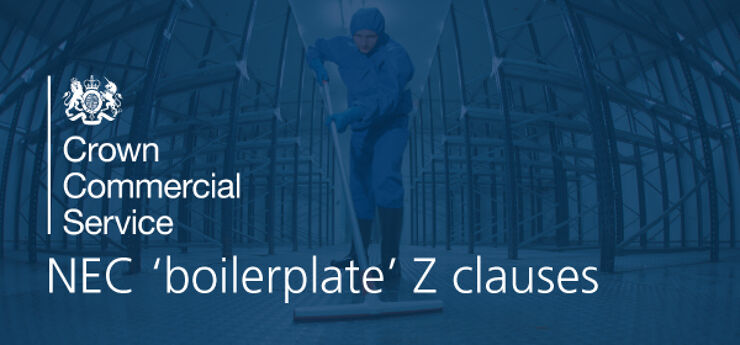
NEC Z clauses and other amendments to standard contracts remain a contentious topic within the construction industry. Their use to incorporate project-specific conditions is often required yet they can detract from the smooth adoption and interpretation of contracts.
UK government departments are obliged to include various legal and policy clauses within every contract as amendments. However, these are generally drafted as separate operations and with differing approaches.
Crown Commercial Service (CCS), the UK’s largest public procurement body, has recently completed a suite of standard ‘boilerplate’ amendments for use on its construction frameworks. The aim is to save time and money for customer departments and ultimately the taxpayer.
Most widely used amendments
Working with the Infrastructure and Projects Authority, CCS analysed how departments drafted and applied similar provisions amended differently. This identified 18 of the most widely used amendments across government, which were as follows:
- Definitions
- Admittance to site
- Prevention of fraud and bribery
- Legislation and official secrets
- Freedom of information
- Confidentiality and information sharing
- Security requirements
- Tax compliance
- Contracts (Rights of Third Parties) Act 1999
- Fair payment
- Building information modelling
- Housing Grants, Construction and Regeneration Act 1996
- Intellectual property rights
- Ministry of Defence conditions (DEFCONs)
- Small and medium enterprises
- Apprenticeships
- General Data Protection Regulation
- Cyber essentials
NEC3 and NEC4 documents
The end result is a suite of five standard boilerplate documents, one each for NEC3 and NEC4 and three for other standard contract forms. Each document includes a detailed introduction and guidance process for both customer and supplier ease of use. They describe how the clauses can be incorporated as a schedule of amendments, with the applicable clauses drafted, reviewed and ready for use.
CCS collaborated with NEC at two different stages of the project. Input from industry experts ensured NEC versions of the document were in line with the language and aims of the parent contracts. This resulted in documents that flow smoothly as extensions to the original contract, so that those familiar with the NEC3 and NEC4 suites will find the amendments similarly useful.
The new documents have been published with the CCS Modular Building Solutions framework and Construction Works and Associated Services framework (e.g. see www.crowncommercial.gov.uk/agreements/RM6088). The wide reach ofthese frameworks will ensure the documents are strengthened through use by multiple customers, standardising and simplifying public-sector construction contracts.
Customer and supplier benefits
Customer departments no longer need to draft their own clauses and can be reassured that policy requirements are being correctly implemented in their contracts. Suppliers will benefit from clearer obligations and a unified approach between customers, improving their contract management duties.
The aim is now for feedback to be gathered from customers and suppliers. An ongoing review mechanism will be created so that each document is regularly updated in line with legislative and regulatory changes, as well as to reflect industry best practice. There is also scope for expansion to different areas, including the NEC4 Professional Service Contract.
For further information, please email construction@crowncommercial.gov.uk.



